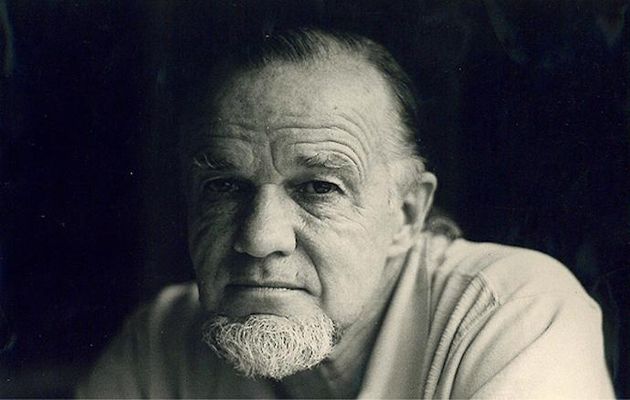Rereading Schaeffer some thirty years later seems eerily prophetic.
 Francis Schaeffer.
Francis Schaeffer.
Penned just before his death in 1984, Francis’ Schaeffer’s forgotten tome ‘The Great Evangelical Disaster’ drew attention to various concerns that lay heavily upon the Protestant thinker’s mind before he passed into glory.
Today, rereading Schaeffer’s book some three decades later seems to almost verge on the prophetic. The Switzerland-based American teacher was able to pinpoint several major themes that have come to plague the evangelical scene in our days.
In this article, we are going to highlight ten major fears that Schaeffer took to the grave which should be of concern to all of us who identify ourselves with the Gospel-centred, Reformation-rooted Protestant faith.
1.- Growing Relativism
Relativism came about due to the Enlightenment’s focus upon the autonomy of man. No longer was God to set the rules and call the shots; but rather humankind was to determine what was good and evil, true and false. Ethics and epistemology became absorbed by an inordinate passion for egoism and self-interest. Once the infallible, inerrant Word of God was openly decried; there was nothing left to take its place but human fancies.
Schaeffer realized that a church built upon the sandy-foundation of relativism could not withstand the onslaught of fallen reason. Only the non-negotiable absolutes of Scripture could enable the church to keep waging a good warfare. It was those “absolutes which enabled the early church to withstand the pressure of the Roman Empire”.1 A relativistic church would have nothing left to say to a sinful culture.
2.- Lack of Discipline
Given the resurgence of pagan relativism throughout post-modern society, many churches had fallen into the trap of downplaying Christian doctrine (absolutes) by refusing to take action against false teachers. Schaeffer identified a lack of church discipline as the real breeding ground for heretics. It was this deficiency which explained the victory of the liberal party within early twentieth-century American Presbyterianism.
 The Great Evangelical Disaster, by Schaeffer.
The Great Evangelical Disaster, by Schaeffer. As Schaeffer makes clear, “Discipline had not been consistently applied by the faithful men of the church”.2 Without ecclesiastical and denominational discipline for doctrinal reasons, the church would be left vulnerable before the avalanche of false teaching.
Hence Schaeffer’s proposal: “The practice of the purity of the visible church first means discipline of those who do not take a proper position in regard to the teaching of Scripture”.3 And again: “Where there is a departure from the historic view of Scripture and from obedience to God’s Word, then those who take this weakened view need to be brought under discipline”.4 Only a high view of Scripture could justify the reestablishment of biblical discipline. If unorthodox ministers were not dealt with, how could their churches stay true to sound doctrine?
3.- Compromise
Christians, according to Schaeffer, are supposed to take a stand for the truth. But the sad mark of his age was one of continual compromise on all fronts, both doctrinal and practical. Schaeffer was upset that many servants of the Lord were no longer willing to confront society with the truth of God. Such a spirit of indifference was leading the church down the slippery slope of apostasy.
Schaffer states, “Truth carries with it confrontation. Truth demands confrontation; loving confrontation, but confrontation nevertheless. If our reflex action is always accommodation regardless of the centrality of the truth involved, there is something wrong”.5 Without a heart-felt faithfulness to the truth claims of Scripture as witnessed in the lives of theological giants like B.B. Warfield (1851-1921), James Orr (1844-1913) and J. Gresham Machen (1881-1937), evangelicalism would not be able to prepare its children for the challenges accompanying the dark days ahead.
4.- Social Work
Instead of keeping focused on the Gospel, many evangelical churches were running off in the liberal direction of “confusing the kingdom of God with a socialistic program”.6 Without denying the importance of helping the downtrodden, Schaeffer was worried at how many minsters were basing their worldview on Marxist doctrine and not upon that of Scripture.
Sin, in Schaeffer’s view, was not down to unjust social structures but to man’s intrinsic wickedness. Iniquity abounded amongst both the poor and the wealthy. The idea of man’s autonomous perfectibility did not stem from Scripture but from a fallen, man-centred Enlightenment philosophy. Even in countries where communist principles had ruled the political world, the results were disastrous with millions massacred on the altar of socialism. So Schaeffer quipped, “A socialistic program is not the answer”.7 Of course churches need to help the poor; but she must keep first things first i.e. the proclamation of the forgiveness of sins through the Lord Jesus Christ.
5.- The Temptation of Ecumenism
The World Council of Churches’ (WCC) call to ecumenical unity greatly disturbed Schaeffer. As well as the pro-Marxist leanings of the WCC, the ecumenical movement was devoid of theological conviction. Every type of non-biblical theological fantasy was being permitted for the love of church unity i.e. Dorothee Sölle’s (1929-2003) rejection of the Lord of Scripture; God being changed from a ‘Heavenly Father’ into a ‘Celestial Mother’; and non-Christian religions being extolled as means of access to the divine, etc.8
This was nothing other than false prophesy. The WCC was becoming a source of theological poison, promoting another Gospel which was no Gospel at all. Only a solid stance on an infallible and an inerrant Bible could bring down the flimsy walls of the WCC camp.
6.- Abortion
Far from assenting to rife abortion-justifying euphemisms such as the ‘quality of life’ or ‘the happiness and well-being of the mother’ or ‘the need for every child to be wanted’, Schaeffer believed that mass abortion was simply the outworking of a revived hedonistic attitude which put a person’s happiness above a sacred respect for human life.9 He was unable to understand how anyone confessing the name of Christ could remain within a pro-abortion denomination.10
In the final analysis, abortion was an all-out attack on the precious image of God which is made known through humankind. “The unborn child is a human being created in the image of God, and to deny this is to deny the authority of the Bible. It is impossible to read Psalm 139 and truly believe what it says without realizing that life in the womb is human life. It is impossible to truly believe in the Incarnation and not realize that the child conceived in Mary by the power of the Holy Spirit was indeed the Son of God from the time of conception”.11
7.- Liberalism
The fruit of theological liberalism had left many formerly-sound churches completely destitute of any spiritual power. Modernism, influenced by German Higher Criticism, had all but baptized the cardinal doctrines of the Enlightenment in the name of Christ. What did such an approach entail? Schaeffer answers: “The denial of the supernatural; belief in the all-sufficiency of human reason; the rejection of the Fall; denial of the deity of Christ and his resurrection; belief in the perfectibility of man; and the destruction of the Bible”.12
Liberal preachers like the acclaimed Harry Emerson Fosdick (1878-1969) had no authoritative Bible left to preach from. Secular humanism took centre stage therefore any doctrine that did not put the spotlight upon man was ultimately done away with. Rather than the church influencing the world; the world took the reins of the church into her Gospel-denying grasp.
8.- Hedonism
Hedonism is the philosophy that the meaning of life ultimately revolves around one’s happiness, pleasure and feeling good at the moment. This hedonistic thrust had led contemporary society to cast off Christian morality in the name of self-fulfilment. Schaeffer was alarmed at how one’s personal welfare was gradually taking primacy over human life i.e. as in the case of abortion. As Schaeffer spells out, “We are surrounded by a society with no fixed standards and ‘no-fault’ everything. Each thing is psychologically pushed away or explained away so that there is no right or wrong. And, as with the ‘happiness’ of the mother taking precedence over human life, so anything which interferes with the ‘happiness’ of the individual or society is dispensed with”.13
Hedonism’s selfish and amoral nature was a real danger facing the church of Schaeffer’s day and the same truth abides in our generation. In some places church has become more about ‘customer satisfaction’ than the true worship of the triune God.
9.- The Loss of Propositional Revelation
Schaeffer insisted upon the need of a strong view of propositional revelation for the spiritual and academic welfare of contemporary Protestantism. Since God, the Creator of all things (language included), was truly there and had desired to communicate his Word to humankind, it was only natural that he should employ the medium of language and hence propositional sentences in order to make his will clear.
This meant that Schaeffer’s stress was not primarily upon a believer’s subjective religious experience, but upon the objective account of revelation displayed in Scripture. Experience was useful in the measure that it lined up with the teaching of the Bible. “What is our foundation?” asks Schaeffer. “It is that the infinite-personal God who exists has not been silent, but has spoken propositional truth in all that the Bible teaches”.14 Take away propositional revelation and the foundation of the Christian is obliterated!
10.- The Inerrant Scriptures
“We have an inerrant Scripture”.15 A final key worry running throughout the whole of Schaeffer’s volume is that of biblical inerrancy. He was incensed to hear of fellow evangelicals who were calling the plenary inspiration of Scripture into question by stressing that the Bible could contain geographical and historical errors despite its teaching upon religion and morals as being true (for the most part). This was the view of the Neo-Orthodox thinkers Karl Barth (1886-1968) and Emil Brunner (1889-1966).
 The acclaimed Swiss Neo-Orthodox theologian, Karl Barth.
The acclaimed Swiss Neo-Orthodox theologian, Karl Barth.Schaeffer disparaged such a view writing that: “The Bible is without error not only when it speaks of values, the meaning system and religious things, but it is also without error when it speaks of history and the cosmos”.16 This was the full view of Scripture as the Word of God at which the American aimed. As far as he was concerned, an errant Bible –if only in the realm of science and history- could never be infallible. Infallibility demanded inerrancy (and vice-versa)!
Although Barth, Brunner and a host of their theological colleagues had launched an anti-liberal revolution in the early decades of the twentieth century, Schaeffer was far from satisfied with their neo-orthodoxy. The chief concern for the American was their manifest lack of a “full view” of Scripture which was due to an overly subjectivist approach to theology.
Rather than saying that the Bible merely ‘contained’ the Word of God or ‘became’ the Word of God by means of an existential encounter with the risen Christ, Schaeffer was adamant that true evangelicalism confesses that “the Bible is objective, absolute truth in all the areas it touches upon”.17
Conclusion
To conclude, Schaeffer’s ten concerns can be traced back to the Enlightenment by which man placed his ‘autonomous’ reason over and against the authoritative revelation of God in Scripture.
It seems to be that in our day the same decision is forcing itself upon all us evangelicals: shall it be the Word of God or the thoughts of fallen humankind that determine our thinking and praxis? Were Schaeffer still amongst us today, he would doubtlessly have opted for the former. What about you?

Las opiniones vertidas por nuestros colaboradores se realizan a nivel personal, pudiendo coincidir o no con la postura de la dirección de Protestante Digital.
Si quieres comentar o